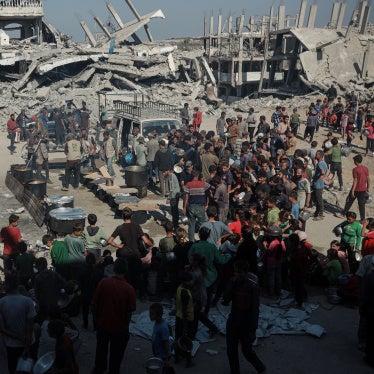The Kurdish government and international relief organizations are badly unprepared to handle the thousands or even tens of thousands of Iraqis who may cross into Iraqi Kurdistan at any time, Human Rights Watch said today
In recent days, Human Rights Watch has visited two reception centers for displaced civilians on the frontline between Kurdish- and Iraqi-controlled areas. Researchers also visited Diyana in Arbil province, the area designated by the Kurdish Democratic Party (KDP) authorities in December 2002 for the establishment of emergency shelters for displaced civilians.
These three sites were supposed to hold up to 10,500 displaced persons. But, as of today, only one hundred tents had been erected with no functional sanitation facilities.
"U.N. agencies had months to prepare for this potential disaster," said Hania Mufti, a Human Rights Watch researcher based in Arbil. "But today, we found local Kurdish relief workers desperately erecting tents in a muddy field outside the town of Diyana."
The potential disaster is made worse by the departure earlier this week of all foreign U.N. personnel and most foreign relief workers, who left only a skeletal local staff and no effective infrastructure in place.
In the days leading up to the outbreak of war, several thousand Iraqis fleeing government held areas crossed into the Kurdish-controlled region. At the same time, hundreds of thousands of civilians left their homes in major cities and towns in Kurdish areas because they feared chemical weapons attacks by the Iraqi military. These newly displaced Iraqis join the ranks of some 800,000 people who were already displaced in the north, from previous conflicts and as a result of ethnically-motivated forced displacement from oil-rich regions. Many of the new arrivals have sought shelter with relatives and friends in the countryside, while others have fled to makeshift camps in the mountainous region north of Arbil.
The World Food Program (WFP) has said that it has 36,000 metric tons of food in northern Iraq, stocked in warehouses in Arbil, Sulaymaniyah and Dohuk. The International Federation of the Red Cross (IFRC) has said that it has relief items for 55,000 people in Iraq.
Yet the newly arriving displaced people in Arbil province have stretched the capacities of local Kurdish authorities. These authorities have no means to provide adequate housing, food, medical and sanitary facilities for the internally displaced. Any further influx of Iraqi civilians into Kurdistan or further displacement within the Kurdish region will create a humanitarian disaster.
Reports from the IFRC indicate that lack of shelter may be one of the most serious concerns. According to the IFRC's appeal dated March 20, 2003, the agency has only 2,000 tents on hand to service the entire country of Iraq. Preparations by the Turkish Red Crescent in northern Iraq have also been slow.
Up to 1,000 displaced civilians who have no relatives to seek shelter with have been relocated to Diyana where they are today being housed in local schools or with town residents. "Without the assistance of the residents of Diyana and the local authorities, these displaced people would be living in far worse conditions," Mufti said.
Displaced families told Human Rights Watch they had no form of heating in the schools and that their only food was provided by townspeople. Diyana's medical facilities are inadequate to cope with the needs of the displaced.
Over the past week, Human Rights Watch has interviewed Iraqis fleeing several cities and towns in Iraqi controlled areas, including Kirkuk, Mosul, Tikrit, Al Ramadi, and Baghdad. Many said they feared the war and were seeking refuge. Others who had fled the cities of Mosul and Kirkuk said the immediate reason for their flight was an Iraqi government campaign, particularly in Kurdish communities, of arrest of males of military age between fifteen and forty-five. They expressed fears that the campaign was intended to conscript men to serve in the armed forces and that they would be sent to the frontlines as expendable targets ahead of Iraqi troops.








